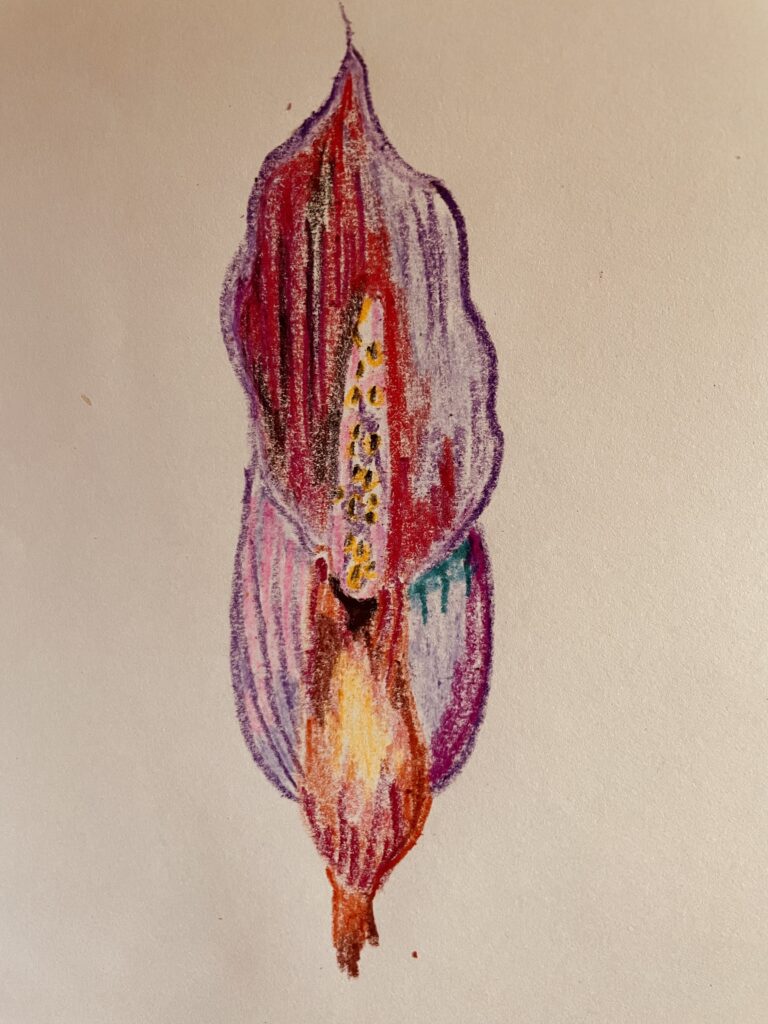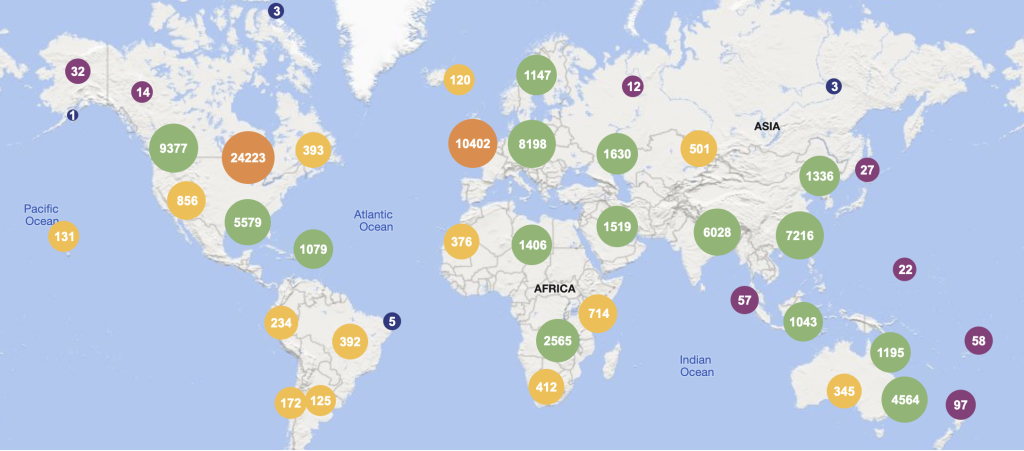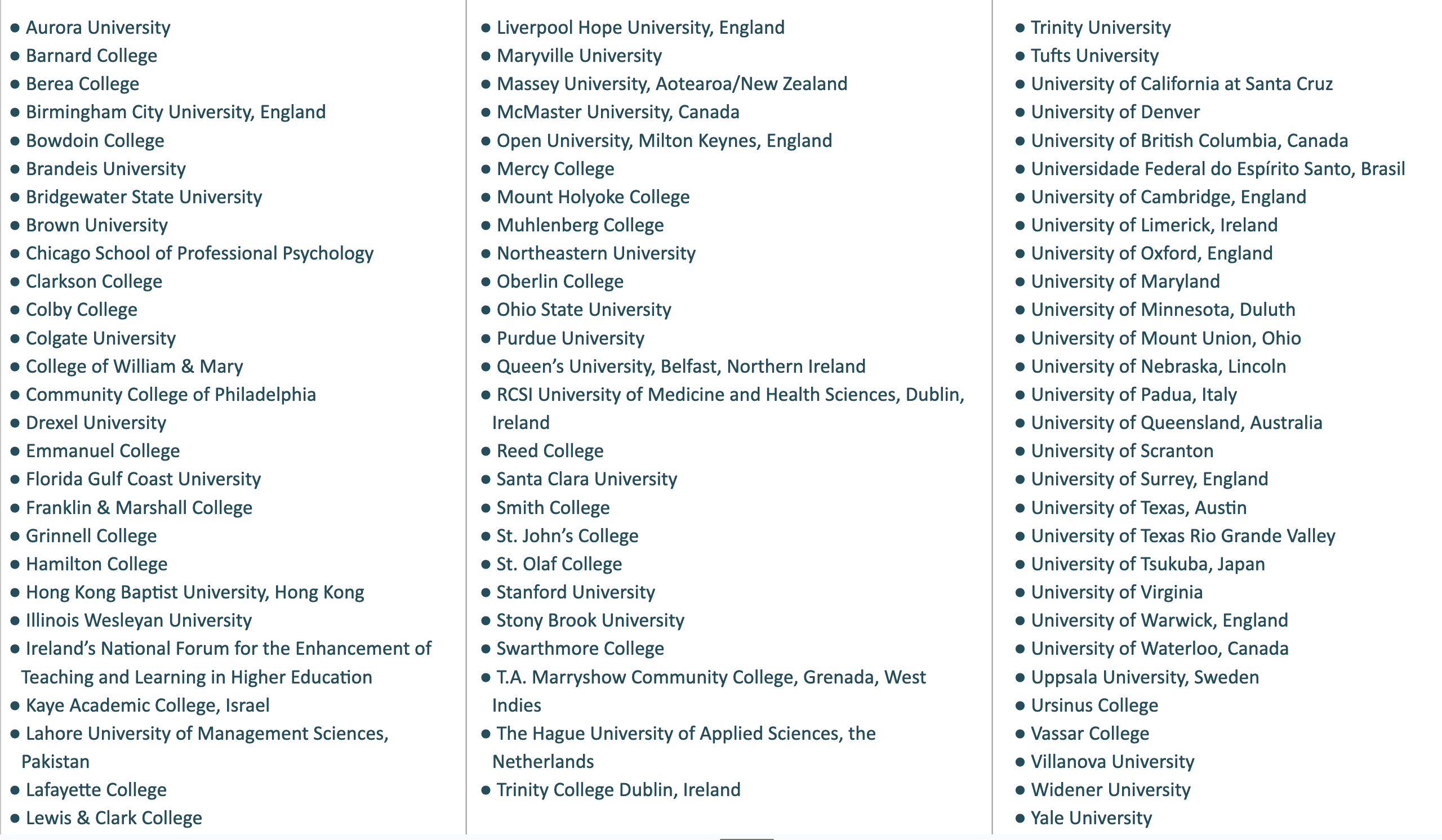
Since the pedagogical partnership program Students as Learners and Teachers (SaLT) was launched in 2007 at Bryn Mawr and Haverford Colleges, an informal network of institutions with similar programs has grown. More than 70 institutions around the world, 40 located in the U.S., have adopted and designed partnership programs to fit their needs.
On this page is a list of institutions that were inspired by the SaLT program. Some of these institutions are paired with reflective quotes on their partnership experiences. Others have produced resources inspired by student-faculty and student-staff partnerships. At the bottom is a map of programs around the world.
Amherst College, Amherst, Massachusetts, USA
Amherst College established a pedagogical partnership program in 2019, and Alison’s mentorship of our leadership team, guidance for faculty and student participants, and willingness to support us as we navigated just-in-time processes has been critical to the success of our program. To kick off the first year of our Pedagogical Partnership Program (P3), Alison provided a fantastic workshop for our entering faculty partners which served to ground them in the literature and frameworks of partnership, encouraged them to invest in meaningful and open relationships with their student partners, and helped them build community among each other.
Riley Caldwell-O’Keefe & Sarah Bunnell
- Read “Understanding the Versatility of Teaching and Learning,” an essay by Eugene Lee, Class of 2023, a student partner, about his experience of agentic engagement through Amherst’s partnership program. [Teaching and Learning Together n Higher Education, Fall 2021]
Berea College, Berea, Kentucky, USA
Leslie Ortquist-Ahrens and colleagues at Berea College developed the Student-Faculty Partnership Program.
Publications
- Read Leslie’s story of Creating Post-Bac Fellow Positions to Support the Development of Pedagogical Partnership Programs at Berea.
- Read an article by Alison Cook-Sather and Khadijah Seay, a graduate of Bryn Mawr College and a post-baccalaureate fellow who helped develop Berea’s pedagogical partnership program: “‘I Was Involved as an Equal Member of the Community’: How Pedagogical Partnership Can Foster a Sense of Belonging in Black, Female Students,” Cambridge Journal of Education, 2021.
- Read a chapter co-authored by a librarian and a student partner, Amanda Eugair Peach and Ashley Ferrell, called “The Student-Faculty Partnership Program’s Potential for Revitalizing the One-Shot Library Instruction Session” (in Cook-Sather, A., & Wilson, C. (Eds.) (2020). Building Courage, Confidence, and Capacity in Learning and Teaching through Student-Faculty Partnership: Stories from across Contexts and Arenas of Practice).
- Read a reflective essay by Leslie Ortquist-Ahrens, “Building Partnership through Partnership: The Power of a Post-Bac Fellow Position in Developing Student-Faculty Partnership Programs,” in International Journal for Students as Partners.
Florida Gulf Coast University, Fort Myers, Florida, USA
Alison [Cook-Sather] was initially a consultant in the design and implementation of our student-faculty partnership program at FGCU, and we modeled our program on the SaLT program she facilitates at Bryn Mawr and Haverford Colleges. Beyond that, though, she has become a valued collaborator, and she has helped me establish and maintain a scholarly approach to our partnership work at FGCU. Even after our formal consulting relationship concluded Alison continued to inquire regularly about our partnership program, offer our students and faculty opportunities to publish about their partnership work, and encourage me to disseminate information about our program. Her guidance and support have been instrumental in the success of our program, which has supported 57 faculty members and 40 students in partnership with one another in the first three years of the program.
Bill Reynolds, PhD, Director, Lucas Center for Faculty Development, Florida Gulf Coast University
Publications and Media
- Reynolds, B., & Pierre, A. (2023, July 11). Reflections on “Teaching and Learning Together: The Opportunities and Challenges of Pedagogy Partnerships”
- Babcock, L. D. (2023, April 28). Student Consultants Give Professors a New Perspective
- Allard, S. (2021). Finding Identity and Agency Through Partnership and Collaboration. Teaching and Learning Together in Higher Education, 34.
- Cook-Sather, A., Allard, S., Marcovici, E., & Reynolds, B. (2021). Fostering Agentic Engagement: Working toward Empowerment and Equity through Pedagogical Partnership. International Journal for the Scholarship of Teaching and Learning.
- Cook-Sather, A., Ortquist-Ahrens, L., & Reynolds, W. (2019, November 13-17). Building belonging through pedagogical partnership: Connecting within and across institutions. [Conference presentation]. POD Network conference, Pittsburgh, PA.
- Reynolds, W., Greene, J., & Halpern, C. (2019, November 13-17). Student-faculty partnerships: Assessing a new program. [Conference presentation]. Pittsburgh, PA.
- Thomas, B., & Reynolds, W. (2020). Applying Student-Faculty Partnership Lessons in a Negotiated Course Redesign. POD. 13 November.
Smith College, Northampton, Massachusetts, USA
Having read Engaging Students as Partners in Learning and Teaching, my colleagues and I invited one of its co-authors, Dr. Alison Cook-Sather, to run a multi-day workshop with us to explore the concept of student-faculty pedagogical partnership in 2016. We were so inspired and learned so much from her, that we decided to design our own program. We retained Dr. Cook-Sather as a consultant during those early years to advise and talk through challenges. The program has evolved, but it continues to this day thanks to the experience, guidance, and ongoing encouragement that Dr. Alison Cook-Sather provided and continues to share with us.
Floyd Cheung, Former Director of the Sherrerd Center for Teaching and Learning, Smith College, USA
Publications
- Halliday, S. D. (2019). Promoting an ethical economics classroom through partnership. International Journal for Students as Partners, 3(1), 182-189.
- Wildhagen, T., & Jenkins, D. (2020). The will to collaborate across difference: Mining difference as a rich resource in a student-faculty pedagogical partnership. In A. Cook-Sather & C. Wilson (Eds.). Building courage, confidence, and capacity in learning and teaching through student-faculty partnership: Stories from across contexts and arenas of practice (pp. 1-9). Lanham, MD: Lexington Books.
- Read a sample syllabus for courses for Smith College student partners.
Kaye Academic College, Be-er Sheva, Israel
The Pedagogic Partnership in Israel started at Kaye Academic College of Education four years ago. We contacted Dr. Alison Cook-Sather early in the planning stages, and very generously, she has agreed to be our mentor for the process at Kaye College. Beyond providing us with useful information and good advice, Alison agreed to cross the ocean and come to Israel to closely guide faculty and students and to respond to the issues that came up during our initial experiences with Pedagogic Partnership. Academic dissemination of our experience with pedagogical partnership was important to us in order to create local academic knowledge. Here also, Alison has kindly agreed to comply with our request to accompany our writing process towards the publication of our insights. A ‘partner’ in Hebrew means a ‘close friend’, and Alison is indeed a close friend to the pedagogical partners at Kaye College in Israel.
Dr. Lea Kozminsky, President, and Dr. Liron Shokty, Head of the English Department, Kaye Academic College, Be-er Sheva, Israel
- Read a chapter by Doron Narkiss and Iska Naaman (2020). Voicing and reflecting in a pedagogical partnership. In Building Courage, Confidence, and Capacity in Learning and Teaching through Student-Faculty Partnership: Stories from across Contexts and Arenas of Practice, Cook-Sather, A., & Wilson, C. (Eds.) (2020).
Lahore University (Pakistan)
The Pedagogical Partnership Program at Lahore University of Management Sciences was the first initiative of its kind in Pakistan. Although faculty and student collaborative work was a longstanding tradition at the university, the partnership program was different primarily because of the nature of relationship it espoused between faculty and students. This relationship based on equal value of the contributions by both partners challenged the traditional hierarchical status between faculty and students. Another challenge was the focus on teaching and learning itself in this research-intensive university. As we fumbled with ideas to introduce the program that was responsive to contextual realities, Alison Cook-Sather’s work became our chief source of inspiration and guidance. Especially her co-authored book, which Pedagogical Partnerships: A How-To Guide for Faculty, Students, and Academic Developers in Higher Education literally served as a step-by-step guide to not only implementing the program but also to navigating our way through issues that needed to be tackled in relation to the making and breaking up of partnerships. Equally helpful has been her work on threshold concepts in academic development that now guides our current research to evaluate the impact of the programme on growth mindsets. Her more recent work around inclusivity and partnerships and her co-authored book Promoting Equity and Justice through Pedagogical Partnerships set examples for help[ing] us to move towards creating equitable and democratic spaces in higher education.
Tayyaba Tamim, Faculty Co-Lead, Pedagogical Partnership Programme, Lahore University of Management Sciences, Pakistan
Publications
- Ansari, H. (2021). Building bridges: Conceptualizing a student-teacher partnership program to improve pedagogical practices. Teaching and Learning Together in Higher Education,33.
- Cook-Sather, A., Ho, L., Kaur, A., & Tamim, T. (in press). Translating Pedagogical Partnership in/to Academic Staff Development in the Global South.
- Gauthier, L. (2020). An Evolution of Learning to Support Partnership Readiness. Teaching and Learning Together in Higher Education, 29.
- Iftikhar, F. (2021). The importance of trust in student-faculty partnerships: My journey from a student partner to a co-lead of a pedagogical partnership program. Teaching and Learning Together in Higher Education, 33.
- Waqar, Y., & Asad, A. M. (2020). Student as co-designer: Processes of planning and teaching with the student in mind. In Building Courage, Confidence, and Capacity in Learning and Teaching through Student-Faculty Partnership: Stories from across Contexts and Arenas of Practice, Cook-Sather, A., & Wilson, C. (Eds.) (2020).
Selected Institutions Inspired by the SaLT Program
- Amherst College
- Berea College
- Brandeis University
- Bridgewater State University
- College of William & Mary
- Emmanuel College
- Florida Gulf Coast University
- Kaye Academic College
- Lafayette College
- Lahore University
- Lewis & Clark College
- McMaster University (Canada)
- Oberlin College
- Reed College
- Smith College
- Syracuse University
- Tufts University
- University of Denver
- University of Scranton
- University of Texas Rio Grande Valley
- University of Virginia
- Ursinus College
- Vassar College
- Hong Kong Baptist University (Hong Kong)
- The Hague University of Applied Sciences (The Netherlands)
- Uppsala University (Uppsala, Sweden)
Alison Cook-Sather readership distribution and partial list of institutions that have invited talks and consultations

